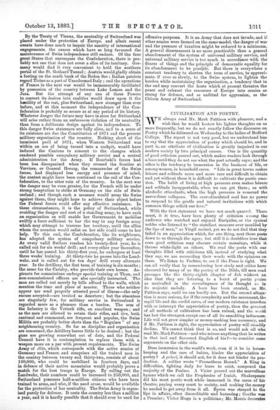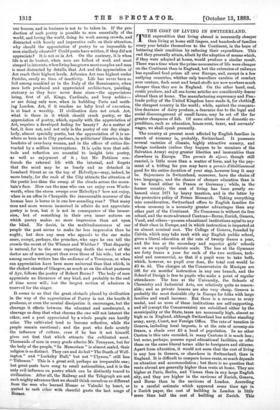CIVILISATION AND POETRY.
WE always read Mr. Mark Pattison with pleasure, and a. wish that he would bestow his lighter thoughts on us more frequently, but we do not exactly follow the discourse on Poetry which he delivered on Wednesday to the ladies of Bedford College. The report is not very good, but we understand him to say that the appreciation of poetry which should be, and in part is, an attribute of civilisation is greatly impaired in our modern society by two principal causes. One is the quantity of good criticism poured out, which makes readers look through a haze until they do not see what the poet actually says; and the other is the tendency to immersion in the business of life, or among women, in household cares. "Life in great towns makes leisure and solitude more and more rare and difficult to obtain and yet without these it is difficult to cultivate the poetic emo- tion. The habit of living at high pressure even makes leisure and solitude insupportable, when we can get them ; as with alcoholic stimulants, when the high pressure is removed the nerve-force collapses. The over-stimulated soul has no power to respond to the gentle and natural invitations with which common things solicit our love."
With the first statement we have not much quarrel. There must, it is true, have been plenty of criticism among the audience who watched and enjoyed Euripides, or the cynical nobles who listened to "the stateliest measure ever monlded by the lips of man," as Virgil recited, yet we do not find that they failed in an appreciation which, for one thing, sent those poets down to us through the ages; but still it is doubtless true that even good criticism may obscure certain meanings, while it throws white-light on others. We read the poets with our thoughts filled with criticisms till, instead of studying what they say, we are reconciling their words with the opinions on them. We listen to Fechter, to see if the Press is right. We can all verify that by remembering how study and critics have obscured for many of us the poetry of the Bible, till men read passages like the thirty-eighth chapter of Job without an idea that they are listening to a burst of poetic praise as unrivalled in tho revealingness of its thought as in its majestic melody. A haze has been created, as Mr. Pattison says, until we can hardly see. But the second allega- tion is more serious, for if the complexity and the movement, the rapid life and the sordid cares, of our modern existence interfere with or intercept the appreciation of poetry, then the greatest of all methods of cultivation has been ruined, and the world has lost the strongest except one of all its ennobling influences. Life will not grow simpler or money-making less necessary, and if Mr. Pattison is right, the appreciation of poetry will steadily decline. We cannot think that is so, and would ask all who read Mr. Mark Pattison—and who misses anything that he writes in that iced and flavoured English of his P—to consider some arguments on the other side.
Does immersion in the world's work, even if it be in house- keeping and the care of babies, hinder the appreciation of poetry ? A priori, it should not, for it does not hinder its pro- duction. A soldier wrote "Prometheus Bound." A King in difficulties, fighting daily for leave to exist, composed the majority of the Psalms. A Vizier poured out the marvellous hymns which we call the Prophecies of Isaiah. Shakespeare did his most poetic work while immersed in the cares of his theatre, paying every court to society, and making the money he needed to get away from it all. Byron was steeped to the lips in affairs, often discreditable and harassing ; Goethe wtts a Premier ; Victor Hugo is a politician; Mr. Morris decorates
our houses, and in business is not to be taken in. If the pro- duction of such poetry is possible to men essentially of the world, and loving the world, doing its work among crowds, and distracted with hourly and imperative calls on their attention, why should the appreciation of poetry be so impossible to men similarly situated P Could poets have written, if they did not appreciate? It is not so in Art. On the contrary, it is when life is at its busiest, when men are fullest of work and most steeped in interests, when living has grown most complex and man is most distracted by details, that Art and the appreciation of Art reach their highest levels. Athenian Art rose highest under Pericles, surely no time of inactivity. Life has never been so full among mankind as in the Italy of the Renaissance, when men both produced and appreciated architecture, painting, statuary as they have never done since—the appreciators being, first of all, Kings, Cardinals, and busy nobles— or are doing only now, when in bubbling Paris and seeth- ing London, Art, if it reaches no lofty level of execution, is at least a worship. If civilisation does not crush Art, what is there in it which should crush poetry, or the appreciation of poetry, which, equally with the appreciation of Art, requires a developed feeling for beauty? As a matter of fact, it does not, and not only is the poetry of our day singu- larly, almost specially poetic, but the appreciation of it is no- where so keen as in City parlours, in politicians' libraries, in the boudoirs of over-busy women, and in the offices of critics dis- tracted by a million interruptions. It is quite true that soli- tude and reflection are essential to insight into poetry, as well as enjoyment of it ; but Mr. Pattison con- founds the external life with the internal, and forgets that the mind may be as lonely and as detached in Lombard Street as on the top of Helvellyn—may, indeed, be more lonely, for the rush of the City attracts the attention of the poetic less than the sweep of the clouds across the moun- tain's face. How can the man who can see enjoy even Words- worth, when the storm sweeps over Helvellyn ? how not enjoy, when in an office in Cheapside the innumerable murmur of the human bees is borne in in one low-sounding roar? That many men and more women immersed in affairs do not appreciate poetry is true, but it is not in consequence of the immer- sion, but of something in their own inner natures on which poetry makes no more impression than art upon the blind. No doubt, in the multitudinousness of our people the poet seems to make far less impression than he ought ; but does any man who appeals to the ear make more, except, perhaps, the preacher, who says he can tell the crowds the secret of the Whence and Whither P That disparity is natural, for to the man expecting death the words of the doctor are of more import than even those of his wife; but who among secular writers has the audience of a Tennyson, or when can appreciation have been more universal than that which, in the choked streets of Glasgow, as much as on the silent pastures of Ayr, follows the poetry of Robert Burns ? The body of men appreciate no literature of any kind, and probably to the end of time never will; but the largest section of admirers is reserved for the singer.
It seems to us that the great obstacle placed by civilisation in the way of the appreciation of Poetry is not the bustle it produces, or even the mental dissipation it encourages, but the cleavage it effects between the educated and uneducated, a cleavage so deep that what charms tbe one will not interest the other, and a poet appreciated by a whole people can hardly arise. The cultivated tend to become reflective, while the people remain emotional ; and the poet who feels acutely the influence of culture, even if he has it not himself, gives out first that which attracts the cultivated most. Thousands of men in every grade admire Mr. Tennyson, but for the body of the people, "In Memoriam" is almost sealed, their religion is so distinct. They can and do feel" The Death of Well- ington" and " Locksley Hall," but not "Ulysses," still less " Tithonus." This is a great evil, perhaps an irreparable one; but great poets have sung to small nationalities, and it is the only evil influence on poetry which can be distinctly traced to civilisation. After all, the Railway and the Telegraph are not such mighty advances that we should think ourselves so different from the men who learned Homer or Valmiki by heart, or quoted to each other with cheerful gusto the last songs of Horace.



































 Previous page
Previous page